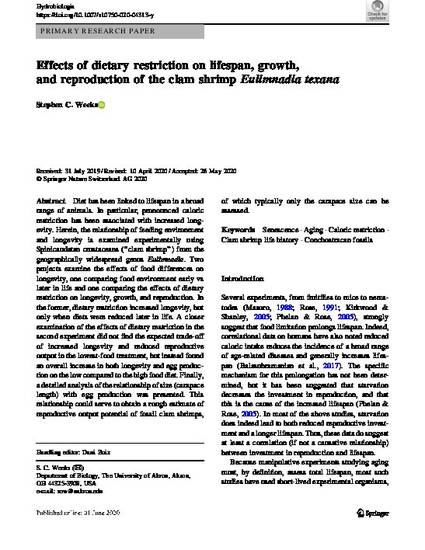
Article
Effects of dietary restriction on lifespan, growth, and reproduction of the clam shrimp Eulimnadia texana
Hydrobiologia
(2020)
Abstract
Diet has been linked to lifespan in a broad range of animals. In particular, pronounced caloric restriction has been associated with increased longevity. Herein, the relationship of feeding environment and longevity is examined experimentally using Spinicaudatan crustaceans (‘‘clam shrimp’’) from the geographically widespread genus Eulimnadia. Two projects examine the effects of food differences on longevity, one comparing food environment early vs later in life and one comparing the effects of dietary restriction on longevity, growth, and reproduction. In
the former, dietary restriction increased longevity, but only when diets were reduced later in life. A closer examination of the effects of dietary restriction in the second experiment did not find the expected trade-off
of increased longevity and reduced reproductive output in the lowest-food treatment, but instead found an overall increase in both longevity and egg production on the low compared to the high food diet. Finally, a detailed analysis of the relationship of size (carapace length) with egg production was presented. This relationship could serve to obtain a rough estimate of reproductive output potential of fossil clam shrimps, of which typically only the carapace size can be assessed.
Keywords
- Senescence,
- Aging,
- Caloric restriction,
- Clam shrimp life history,
- Conchostracan fossils
Disciplines
Publication Date
Summer June 1, 2020
DOI
10.1007/s10750-020-04313-y
Citation Information
Stephen C. Weeks. "Effects of dietary restriction on lifespan, growth, and reproduction of the clam shrimp Eulimnadia texana" Hydrobiologia Vol. 14 (2020) p. 3067 - 3076 Available at: http://works.bepress.com/stephen_weeks/21/
